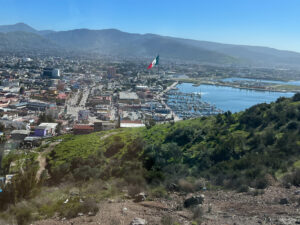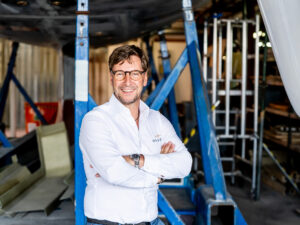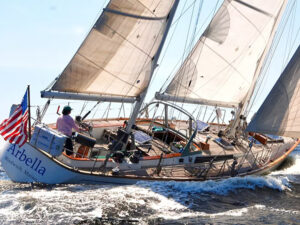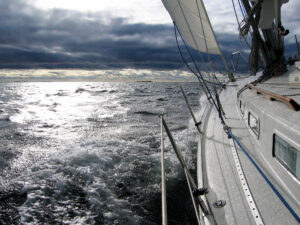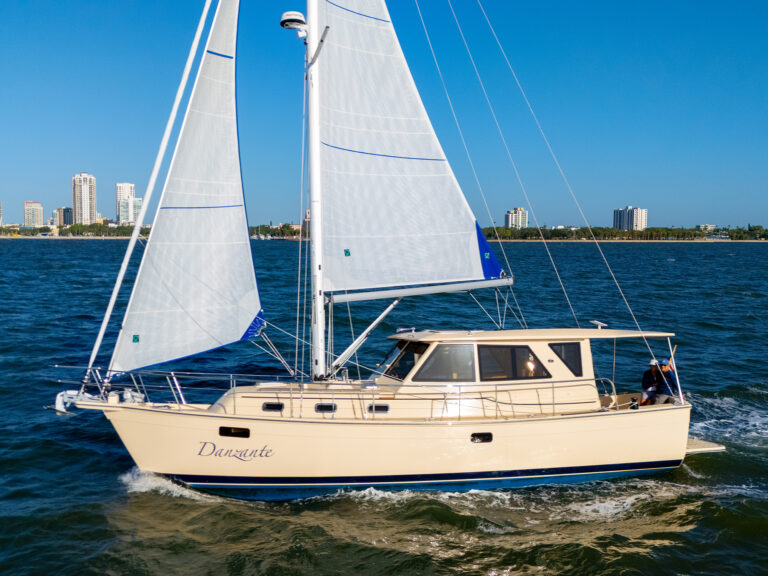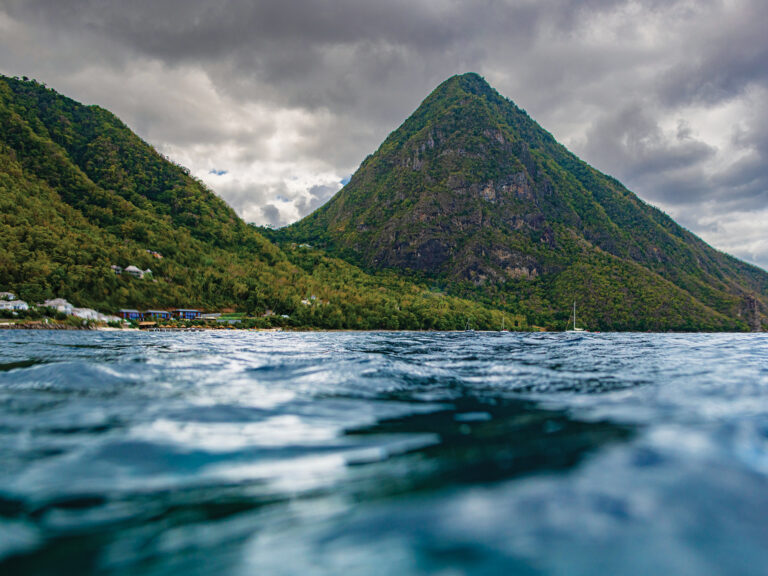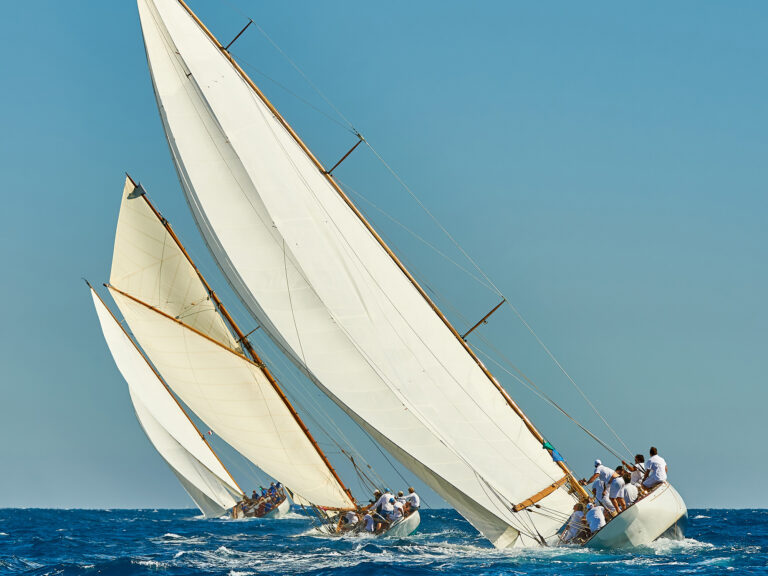
On the island of Boddam in the Salomon group of the Chagos Archipelago, by British law and regulation, there are no people ashore—no cops, no preachers, no creeps. There’s no governmental presence at all, save for an occasional boatful of scientists on the misnamed Pacific Marlin that visits once a month to throw an ice cream party for any wayward sea gypsies who may have wandered in. The area is a British Indian Ocean Trust with a dark and complex history. While cruising-boat entry regulations continually change, it was paradise on Earth when we visited in 2003.
There were three cruising boats anchored in the lagoon when we arrived: a German couple, a Scottish singlehander, and a couple of Brits, one of whom was a playwright and an expert on Henry Miller.
Of course, the odd Frenchman would occasionally wander in.
The beauty of Boddam lies in what it lacks. There are no landsmen within 100 nautical miles, no dock, no airport, no heliport, no communications, no electricity, no drinkable water—just a million coconut palm trees and a lagoon full of fish attracted to the sound of a sizzling skillet. I didn’t believe such a place could still exist on Earth until I sailed in and saw it with my own eyes. Once I realized it did—that Chagos wasn’t a myth—we unexpectedly stayed for four delightful months.
It answered every Robinson Crusoe fantasy I’d ever had.
There were eco-rules, of course, and we and our fellow sea gypsies followed them diligently.
One of the rules was to take nothing from—nor leave nothing on—the isle. (There are 60 islands in the group, with only the distant US military base Diego Garcia being inhabited.)
While the inside of Boddam lagoon was flat-calm, the windward side of the island (about a half-hour hike to the west) was rough and windswept. Carolyn and I would visit each day—she to do her yoga, I to meditate on the book I was spewing. One day at high tide, a particularly large sea thundered up the beach, leaving behind an industrial wooden wire spool. I rolled it up the beach a tad. We often brought lunch with us. It made a nice table for food prep. (It took less than 60 seconds to catch a Celebes sweetlips or spotted grouper in Chagos, and the water was so clear that at 40 feet, you could pick your fish by yanking the hook away from the less tasty.)
Anyway, that same day I found a half-buried fishing net, and strung hammocks and hanging chairs by the table. Wood wasn’t a problem—the place was littered with it—but I didn’t bring fastenings ashore because it was against the rules. Instead, I lashed together our impromptu, God-given beach kitchen. Within the week, a large log was tossed onto the beach for us. Now we had a long seat for our musical parties. (I might be the only musician alive who sings Dylan songs worse than Bob.)
It was a wonderful day when the plastic bucket washed up. That made our dishwashing and fish filleting much easier.
While we mostly lashed things together, several planks washed ashore with nails and primitive spikes from Africa and India, so we had options. We built our own private Garden of Eden using only what the Good Lord provided daily. Clothes were frowned upon. Hell, it wasn’t even a sin; we were married.

Coconuts are, we discovered, aphrodisiacs. We drank their juice, ate their meat, burnt their husks to keep away the “mossies,” and used their shells as cups and bowls. We were in perfect balance. We didn’t even listen to the BBC. (This was before we had Pactor modems or satphones, thank gosh.)
Yes, fresh water was a problem. We didn’t have a watermaker. At one point, we had only 2 gallons of water and half an ocean to cross before reaching Madagascar. Nonetheless, “when you’re hungry, the fish will bite” is an old Goodlander saying, and it’s true. As the monsoon changed direction, it brought heavy rains, and our water tanks bulged.
On our last day in Chagos, at precisely high tide, I took out my knife and cut all the strings with which I’d so carefully lashed together our little unplanned village. A wave swept in and carried away half of the small bits. We left it exactly as we discovered it, as if waking from a dream.

It is a perfect memory of Paradise Found for us both. Of course, we’ve never made the mistake of returning there and shattering the perfection of our idyllic experience. But whenever I hear the word “perfect” bandied about, I think of those romantic moments in Chagos in my lover’s arms.
Madagascar was wonderful too—but in an entirely different way. A fisherman with a canoe full of crabs, lobsters and fish (“Change, change!” was his only English word) came alongside and negotiated hard for two AA batteries. We discovered, a few days later, that he’d stylishly pierced them through his earlobes. Yeah, the Malagasy are quite fashion-conscious. I thought that one young construction worker was going to move his family from his current mud hovel and into a new cinder-block house he was building, but he immediately disabused me of the idea.
“House?” he asked, confused. “This isn’t a house. I’m going to be in this world for only a few more years with that woman and our kids. This is my grave! And I’m going to be there for all eternity so, of course, I want it nice.”
How can you argue with that?
One early morning while wandering the back alleys of Hell-Ville (very accurate, that name), we came across a hut that had a sign that read “Coffee Shop.” Inside was a sleeping family. Once awake, they were overjoyed to see us.
“Yes, two cups of coffee, coming right up,” the man said as his fleet-of-foot wife ran one way and the kids another.
We waited. The kids came back with sticks. The wife came back with something small in her pocket. The man returned with something in a sack. Everyone was eager and friendly. The bright-eyed kids were a joy. We bantered as the man dug a hole in the earthen floor, placed the kindling in, and used the precious matches his wife handed him to light the fire. Soon, the water would be boiling.
Well, first he had to slow-roast the coffee beans he’d just gathered in the sack. That brought us to late morning, which we didn’t mind because, hey, Madagascar moves at a slow pace. Around noon, his wife and children carried in a large wooden bowl and the heavy trunk of a palm tree. Huh?
He placed the hot, roasted beans in the bowl, and then began slowly lifting and dropping the palm tree trunk onto the beans, smashing them to bits instead of grinding them. It was early afternoon by this point, and we were helping the kids with their 2+2 homework as the wife laboriously washed two tin cups (in front of us, so we’d see) with fresh water she’d carried on her head from a mountain stream. The kids were napping when their parents finally tossed the battered galvanized bucket of water on the fire to boil. Fairly quickly after that—well, certainly before the sun went down, anyway—we had our coffee.
“Would you like another cup?” the husband asked hopefully.
“No, no thanks,” I said hastily. “We’ll come back when we have more time.”
Oh, Madagascar was a trip, all right. Just clearing in involved an elaborate scam that commenced in the police station (to lull us into a false sense of security). It involved five skillful actors on two different sets, one large, ruined World War II hospital, a dilapidated taxi, two hours, fake receipts, a very long walk back into town, and a distinguished-looking con man in a finely tailored Brooks Brothers suit. All to cleverly trick us out of 12 bucks. Damn, the greedy lengths some people will go to when they aren’t starring in a Disney film. (I’m too embarrassed to reveal the specific details of our gullibility—perhaps on my deathbed.)

One of the reasons I was there was to get a picture of a rare and elusive lemur for a big-money magazine story I was writing. As we pulled our dinghy onto the beach under a tree so its shade would protect our camera equipment, it began to “rain” dozens of lemurs. I screamed at Carolyn, “Camera, camera, goddammit!” She frantically sorted out the photographic gear with the help of five or six screeching lemurs on her head and shoulders. (Yes, we got the shot.)
The strangest time was far up a tidal river, when an entire tribal family canoed out in search of cassette tapes. “Sure,” I said. “What type of music do you like?”
They looked confused. They had no cassette player. They wanted the tape inside the cassettes to make decorative ribbons and bows. Here’s what had happened. One brother had gotten a flat tire on his bike, and the other had lost a flip-flop, so they knew the gods were angry. Thus, they gathered their entire extended family together, had a huge family feast on Saturday, and dug up all their dead relatives from the front yard. With used toothbrushes, they cleaned the bones and then decorated them with bows before reburying them—thus assuring themselves of another year or two of good luck.
Is everything about Madagascar equally fairy-tale-esque? Not quite. There’s a beach restaurant that many yachties go to upon arrival because the food is cheap and good. They anchor off the beach and come ashore at dusk for dinner. Usually, there’s a local fisherman there with his young sons. They have a kerosene light swaying on a pole at the bow of their boat. As the yachties take their seats, they see the fisherman going out to the reef to anchor and fish. The food is wonderful: course after course of extremely fresh seafood. Hell, they’re watching the very fisherman who caught their dinner out on the reef right now. See the swaying light! They stay far longer than intended as the owner showers them with rum. Local lads even do an impromptu fire dance on the beach as they depart, complete with firecrackers.

Arriving back aboard their vessel, they find that it has been picked clean. What they didn’t notice during dinner was the fisherman placing that swaying light on a preset pole on the reef and going to their vessel directly in line with it to be invisible to them. And the whole thing being orchestrated and communicated by the restaurateur with his audio firecrackers and visual flames. Live and learn, I guess.
Perhaps best of all is seldom-visited St. Helena, where Napoleon Bonaparte took the count. There’s no harbor, and it’s far too rough to land a dinghy on the beach. Instead, the officials pick you up on a bumboat with a sort of mini heliport aft that has a strong pole in its middle to catch as you leap aboard. (The deep anchorage is far too rough to come alongside.) On the quay is a giant swingset with the harbormaster standing beneath it. He’s a huge bear of a man with a bushy red beard and massive arms.
The crew ordered me to the pole as we hovered 40 feet off the dock. They told me to wait. They and the harbormaster watched the giant swells passing beneath us with intense interest. “No,” they said. “No.” “No.” “Maybe…Get ready…Now!”
At the apex of the 12-foot swell, the harbormaster swung out a giant hawser, which I grabbed at the same moment the bumboat disappeared out from under me. As I came swinging into the quay screaming, the burly harbormaster caught me in his arms and said calmly, “Welcome to St. Helena.” How cool of an island entrance is that?
Nobody on the island knows how old the local taxi is—only that it was used when it came to the island in 1926. Yes, we got drunk at Anne’s and sat and gammed at the nearby yellow (perfectly preserved) house that featured a faded photograph of Joshua Slocum doing the same, in the same house, on the same couch.
While on St. Helena, don’t give away any sports scores; their only international news in those days came from weekly VHS tapes of BBC World. Hint: If you want to sit on Bonaparte’s tiny deathbed, as I did, you have to make friends with the executive assistant at the French embassy. He’ll drive you out to the house in his dune buggy for a bottle of chilled champagne.
I could go on forever. How can I leave out Borneo with Barry the gibbon (a small ape), who swings from the trees and into your rig, climbs down the forehatch, strolls boldly to the galley, searches it, finds the Joy dishwashing liquid, happily spins off its cap, chug-a-lugs all the soap, and then goes laughingly back into your rig, gleefully blowing bubbles from both ends.
What’s my favorite isle? It is hard to say. Hopefully, my next.
Carolyn and Fatty Goodlander are still “hard aground on their coffee grounds” off the Changi Sailing Club of Singapore.

